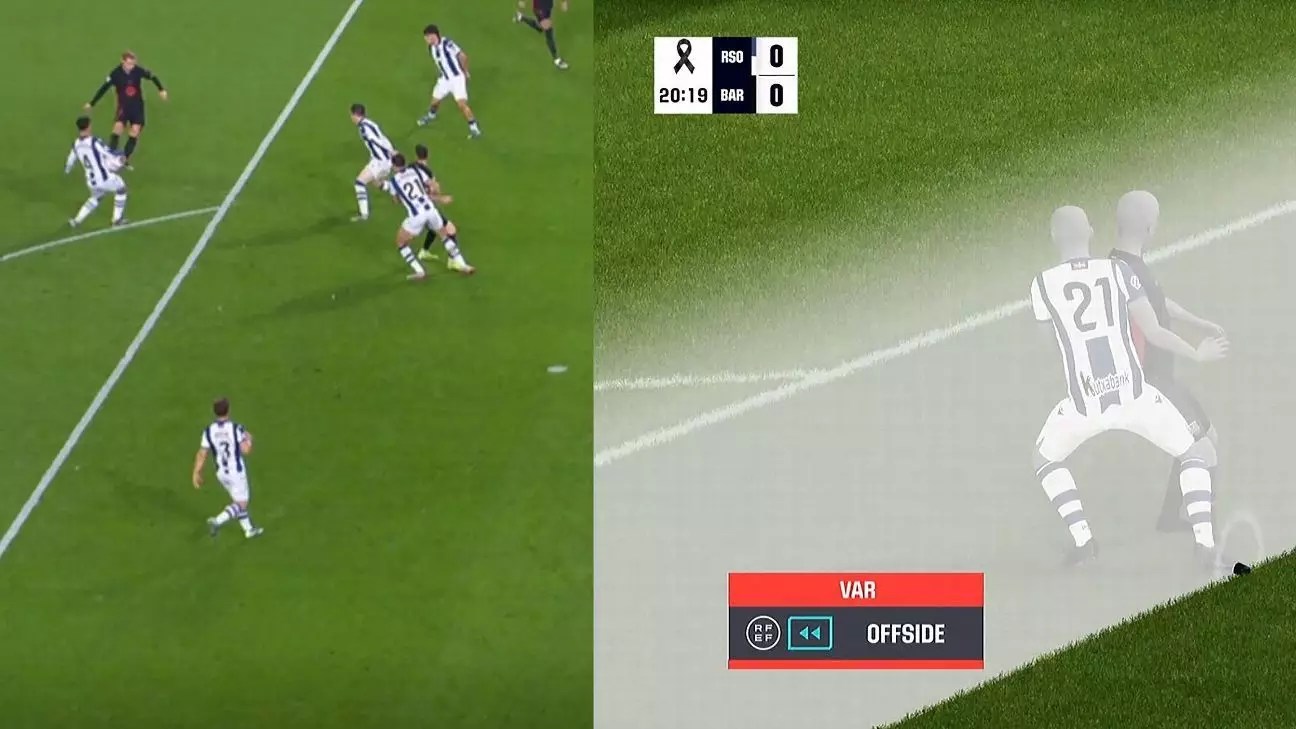The world of football is no stranger to controversy, especially regarding decisions made by officials that can make or break a match. Recent comments made by Deco, the sporting director of FC Barcelona, have stirred discussions about the application and effectiveness of the semi-automatic VAR (SAOT) technology during their recent match against Real Sociedad. In a closely contested match where Barcelona found themselves on the wrong end of a 1-0 defeat, a pivotal moment arose when Robert Lewandowski’s goal was disallowed under contentious circumstances. Deco’s insistence on a transparent explanation underlines a critical need for clarity in a system that has become central to the interpretation of the game.
The Disallowed Goal: A Turning Point?
In the 14th minute of play, Lewandowski found the back of the net, a moment that would have shifted the momentum in favor of Barcelona. However, the joy was short-lived as VAR reviewed the goal and deemed Lewandowski to be offside by a slender margin. The suggested infraction arose from the positioning of his toe in relation to Nayef Aguerd, a decision that sparked an outcry from Barcelona’s coaching staff, including head coach Hansi Flick, who labeled the call as “wrong” and “a huge mistake.” This incident reveals an ongoing challenge within officiating, revealing how minimal technical misjudgments can lead to significant implications for the teams involved.
Deco’s comments reinforce a growing sentiment among football enthusiasts and professionals alike: is VAR truly serving its intended purpose? Designed to enhance the accuracy of officiating, the semi-automatic system is supposed to lend clarity to decisions that can often be ambiguous. However, Deco pointedly remarked, “some things have improved, but in other areas, we still have one person’s interpretation,” emphasizing that while technology evolves, it doesn’t come without its flaws.
He raised critical questions regarding the nature of “semi-automatic” versus “automatic” systems, bringing to light the confusion that exists even among seasoned professionals. If a situation arises where determination lies in subtle distinctions, it prompts a reevaluation of whether technology truly eliminates human error or simply tweaks current problems into new forms.
VAR Implementation: A Broader Context
The introduction of SAOT into La Liga at the beginning of the season was seen as a progressive move to refine the officiating process. Utilizing 12 cameras that track up to 29 data points per player, including limbs and extremities relevant to offside decisions, the intention is to provide less room for ambiguity. Yet, the implementation has not been without its teething issues, which lend credence to Deco’s call for introspection into the system’s functionality. Other leagues, like the Premier League, have opted to delay the roll-out until they can address these challenges adequately, suggesting that caution is warranted when approaching changes this significant.
The uproar from Barcelona’s leadership regarding this single disallowed goal is not merely a knee-jerk reaction; it reflects broader concerns about consistency and reliability in decision-making across all of La Liga. As Deco remarked, should the semi-automatic system yield erroneous outcomes, it may be time to revisit existing protocols entirely—this sentiment echoes the thoughts of many who hope for improvement in officiating processes league-wide. The power of technology stands still; there is a perpetual risk that it could hinder rather than help.
The Rising Star: Lamine Yamal
Amidst the discussions about officiating, an additional narrative has emerged concerning young talent Lamine Yamal, who was absent for the game against Real Sociedad. The 17-year-old continues to gain recognition for his burgeoning role within the team, featuring in conversations about future stars. Deco’s acknowledgment of the overwhelming comparisons to Lionel Messi raises both a sense of pride and concern regarding the expectations placed on Yamal. While such comparisons may be flattering, they also bear the weight of inevitably high standards, demonstrating how the sport’s emotional stakes are inextricably linked to the individual narratives of its players.
As the dust settles on yet another controversial officiating episode within elite football, Deco’s call for clarity and evaluation resonates deeply. It is not merely a Barcelona issue but one that affects the integrity of the sport across the board. Whether or not the technology succeeds in measuring precision will depend on the ongoing discourse about its application and fidelity. Ultimately, as football fans and members of the global football community continue to advocate for transparency, the sport stands at a crossroads—one that may define its future relationship with technology.


Leave a Reply